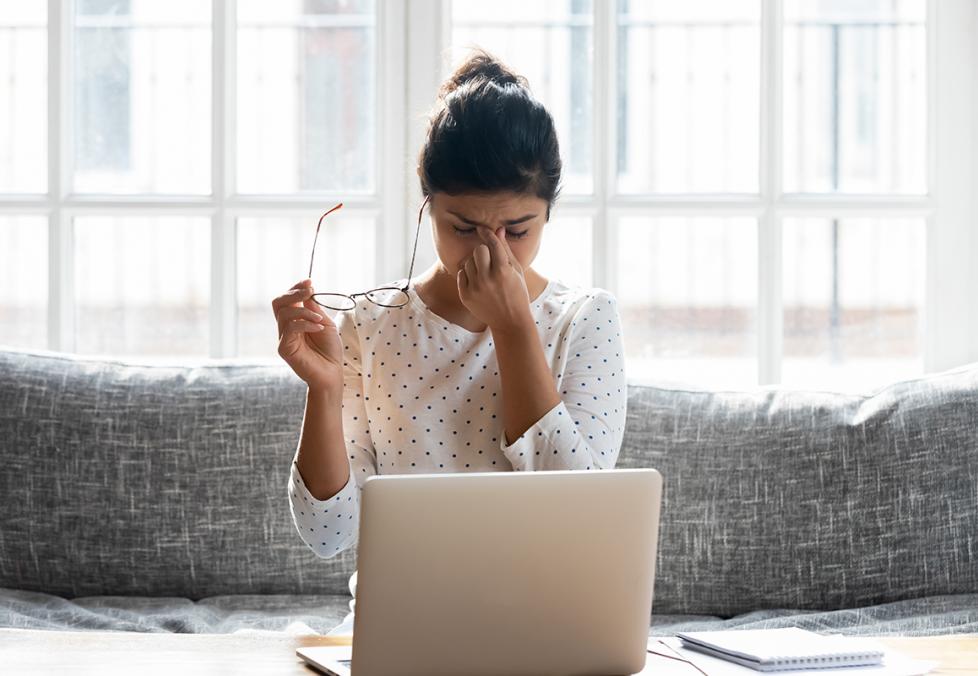
We accept thousands of plans!
Everything you need to know to take care of your eyes — for life.
An America’s Best optometrist answers your burning questions about eye allergies, including how to find relief and stop your symptoms in their tracks.

When your eyes are red and itchy, you want relief, and you want it now.
But reaching for the wrong remedy can prolong bothersome eye allergy symptoms. That’s why it’s so important to know how to tackle eye allergies the right way.
Anthony Giallombardo, O.D., an optometrist at America’s Best Contacts & Eyeglasses in Toms River, New Jersey, weighs in to answer your most pressing questions about eye allergies. Here’s what you need to know to find relief fast — and even stop your symptoms before they start.
You can thank your immune system for those bothersome eye allergy symptoms. It’s overreacting to typically harmless substances called allergens.
When your eyes are exposed to an allergen, your body releases mast cells. “Mast cells are responsible for the release of histamine, which makes the eyes itchy,” says Dr. Giallombardo.
Common allergens include:
Has it been a while since your last eye exam? Now’s the time to book an appointment!
Allergies primarily affect the conjunctiva. That’s the thin, transparent membrane that protects the white of your eye. When mast cells in this part of the eye release histamine, it causes blood vessels to swell. Though the blood vessels are always there, they usually aren’t visible.
Other common eye allergy symptoms include tearing, itchiness, redness, and burning.
“At night, our eyes flush themselves out,” says Dr. Giallombardo.
When you’re asleep, your conjunctiva produces fluids that flush debris out of your eyes. That’s why your eyes may be crusty when you wake up in the morning.
As a result of this flushing process, you may wake with fewer eye allergy symptoms than when you went to bed.
However, there are some exceptions to this rule. If you’re allergic to something in your bed — such as a pet — you may wake with symptoms that have worsened overnight.
Both conditions involve inflammation of the conjunctiva. Pink eye, however, is caused by a bacterial or viral infection, and it’s contagious.
Unlike pink eye, allergic conjunctivitis isn’t contagious. It’s caused when an allergen triggers mast cells to produce histamine.
One easy way to tell the difference: pink eye tends to affect only one eye at a time. Allergies usually affect both eyes, since both eyes are usually exposed to the allergen (such as pollen, for example).
“However, sometimes allergies can affect one eye more than the other — if, for instance, someone pets a cat and rubs one eye with that hand,” says Dr. Giallombardo.
Heat. When you’re dealing with eye allergies, stay away from heat.
“Warm compresses work great for people with dry eyes,” says Dr. Giallombardo. But not so much for eye allergies. Applying a warm compress to your eyes can cause the blood vessels to expand, leading to more irritation. Stick to a cool compress instead.
Extended-wear contacts. Wearing certain types of contact lenses may also worsen eye allergy symptoms.
“Once allergens get onto a contact lens, it can be challenging to clean them off,” says Dr. Giallombardo. “Then, whenever someone reinserts the lens into their eye, they retrigger their allergy symptoms.”
Monthly contact lenses need to be removed at night and cleaned before being reinserted into the eye. For people with eye allergies, dailies may be the better option. That way, every pair you use will be brand new and allergen free.
Recommended reading: Monthlies vs. Dailies: Which Contact Lens Is Best for You?
Red eye drops. Some people use over-the-counter drops that are known as vasoconstrictors to reduce eye redness. However, those don’t treat the underlying problem. They can also lead to rebound redness. When the medication wears off, your eyes can be even redder and more inflamed than before.
If you need your eyes to appear white with minimal side effects, use a product that contains brimonidine tartrate, such as Lumify®, says Dr. Giallombardo. Those products reduce redness without leading to a rebound effect.
“Allergies come and go, to a certain extent,” says Dr. Giallombardo.
People can develop eye allergies at any time. A substance that never bothered your eyes before may suddenly cause itching and redness.
On the bright side, sometimes people outgrow their allergies or build a tolerance to them, he adds. In other words, the things that used to trigger symptoms when they were younger no longer do so when they get older.
Optometrists can help you better understand what’s really causing your discomfort. That’s important because several eye problems share the same symptoms. For example, your redness and burning may be the result of dry eye rather than allergies. Or it could be from an infection.
“A trip to the eye doctor can help prevent a misdiagnosis,” says Dr. Giallombardo. “When we look at the eyes, we’re able to identify the issue and guide you to the right treatment plan.”
Visiting an allergist may also be helpful in tackling your eye allergy symptoms. Skin prick testing can quickly get to the bottom of what does and does not trigger your allergies. That can help eliminate some guesswork, allowing you to take effective steps to prevent allergies before they start.

We accept thousands of plans!
Your optometrist will do a thorough eye exam to determine whether you have eye allergies.
One telltale sign: “In people with allergies, we find raised bumps called papillae. Those bumps are from tissue that has swollen in response to an allergen,” says Dr. Giallombardo.
Several over-the-counter medicines work effectively as eye allergy treatments. They include: